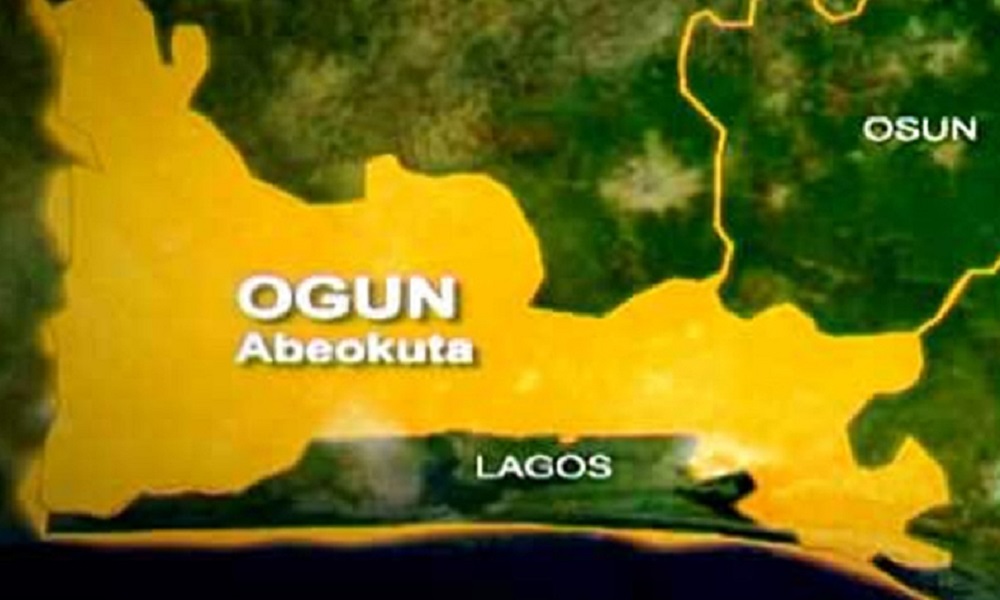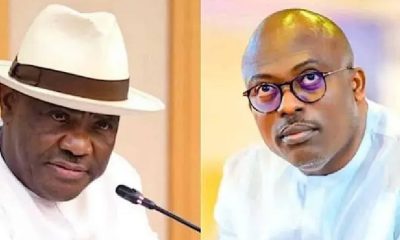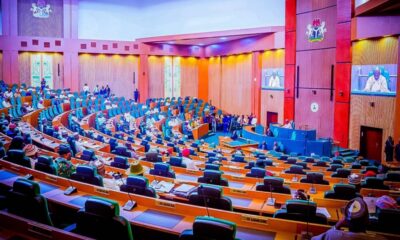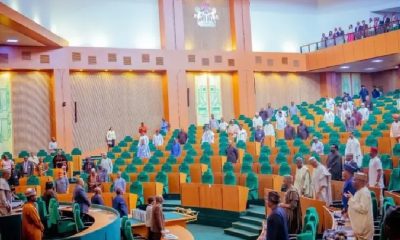News
Agric ministry pledges to reduce post-harvest losses by 25%

By Francesca Hangeior
The Federal Ministry of Agriculture and Food Security has pledged to significantly reduce post-harvest losses in the agricultural sector by 25 per cent as part of its efforts to ensure food security and boost domestic production.
This commitment was made during the Special Agro-Industrial Processing Zones High-Level Implementation Acceleration Dialogue held in Abuja on Monday.
The Special Agro-Industrial Processing Zones initiative is a Nigerian government programme aimed at boosting agriculture through targeted investments, integrating farming, processing, and marketing to increase productivity, reduce losses, and enhance value addition for food security, job creation, and poverty reduction, supported by the African Development Bank, International Fund for Agricultural Development, and Islamic Development Bank.
In his keynote address, the Minister of Agriculture and Food Security, Abubakar Kyari, emphasised the urgent need for a collaborative approach to address the existing challenges within the agricultural sector.
“Our objective is clear: we must enhance our production capabilities and reduce post-harvest losses from the current 45 per cent to 20 per cent. This is critical not only for food security but also for improving the livelihoods of our farmers,” Kyari stated.
According to him, the SAPZ initiative aims to create agro-industrial processing zones across seven states and the Federal Capital Territory, focusing on key crops like cassava, rice, maize, and cocoa.
He added that the programme is expected to generate approximately 500,000 direct and indirect jobs while also contributing additional metric tonnage to the nation’s food supply.
Finance Minister Wale Edun, speaking at the event, reinforced the government’s commitment to industrialisation through agriculture.
“The successful production of food is fundamental to our economic stability. When we achieve our production goals, we will see a significant impact on inflation, interest rates, and ultimately, our trade balance,” he said.
Edun highlighted the collaboration between the federal and state governments, as well as private sector partners, as vital for the success of the SAPZ programme.
“We cannot afford to disrupt domestic production while addressing the immediate food needs of our population. This requires a careful balance of both short-term and long-term strategies,” Edun added.
The Country Director of the African Development Bank, Abdul Kamara, also spoke at the workshop, underscoring the potential of the SAPZ programme to transform the rural economy.
“By reducing post-harvest losses from 50 per cent to 10-20 per cent, we can make a significant contribution to the economy and improve food security,” Kamara stated.
He encouraged all stakeholders to work collaboratively to address challenges impeding implementation.
The workshop brought together various stakeholders, including state governors and representatives from development partners, to discuss the acceleration of the SAPZ programme.
Dr. Abdulkazumare, representing the Governor of Kaduna State, emphasised the need for innovative solutions to current constraints.
“Our goal should be to learn from successful models globally and adapt them to our local context,” he added.
The Agriculture Minister stated that as discussions continue, the Agriculture Ministry remains optimistic about the outcomes of the SAPZ initiative, which it sees as a cornerstone of Nigeria’s agricultural transformation and economic growth.
“The path forward requires not just commitment but also effective communication to galvanise public support.
Together, we can build a resilient agricultural sector that meets the needs of all Nigerians,” Kyari said.
The Country Director of the International Fund for Agricultural Development, Dede Ekoue, expressed gratitude for the initiative, stating, “We would like to extend our warm congratulations to the Honourable Minister of Agriculture and Food Security for this laudable initiative.”
He also recognised the leadership of the Minister of Finance, stating, “His leadership in facilitating the finalisation and implementation of the Financing Agreements has been invaluable.”
Ekoue highlighted ongoing efforts in Kano State, where IFAD is supporting an accelerated pilot project aimed at enhancing the capabilities of rice and tomato farmers.
He emphasised the importance of partnerships, saying, “We are pleased that the implementation of these strategies has led to some quick wins, such as the signing of off-take contracts.”
The director stressed the need for collaborative efforts, adding, “We must work together to address the challenges affecting implementation.”
He outlined key actions to enhance the programme’s success, including strengthening coordination and technical capacity.
Regarding Ogun State, Ekoue acknowledged the signing of a subsidiary loan agreement and expressed hope for further agreements to expedite project implementation.
“We are convinced that this strategic gathering will empower all stakeholders to accelerate the implementation of SAPZ at these critical times for food security and inclusive economic growth,” he said.
News
Your Best Days in Politics Are Still Ahead – Speaker Abbas Tells Kalu

By Gloria Ikibah
Speaker of the House of Representatives, Rep. Tajudeen Abbas, has hailed his Deputy, Rep. Benjamin Okezie Kalu, as a rising force in Nigeria’s political landscape, describing him as a man whose journey is only just beginning.
Abbas gave the remarks on Tuesday inside the chamber, shortly after plenary, as members of the House gathered to celebrate Kalu’s 54th birthday with a brief ceremony and a cake-cutting session.
Kalu, who represents Bende Federal Constituency of Abia State, turned 54 on Monday.
A lawyer by training and former spokesperson for the House, he has grown into a familiar face not just within Nigeria’s legislature but also across international parliamentary networks.
In recent times, Kalu has taken on significant continental and global responsibilities. He chairs the Finance and Administrative Committee of the ECOWAS Parliament and leads the African Union Parliament’s Committee on Monetary and Financial Affairs. He is also an active member of the Inter-Parliamentary Union and sits on the steering committee of the Parliamentary Conference on the World Trade Organization.
His colleagues describe him as strategic, forward-looking, and quietly ambitious, a lawmaker whose blend of eloquence and diplomacy has made him a respected voice both at home and abroad.
Speaking to journalists after the brief celebration, Abbas said, “Benjamin Kalu is not just a Deputy Speaker. He is a man with vision, poise, and the kind of political maturity that Nigeria will need even more in the years to come. His future is very bright.
News
Council poll: APC working on consensus candidates ahead of primaries

Lagos State chapter of the All Progressives Congress (APC) is working towards consensus candidates for the upcoming primary election scheduled for Saturday.
The move is part of the party’s efforts to maintain unity and reduce internal frictions.
Five aspirants emerged unopposed following the screening organised by the party.
The incumbent Chairman of Surulere Local Government, Sulaimon Yusuf; his counterpart in Iba Local Council Development Area (LCDA), Jubril Yisa; Motunrayo Alogba of Ijede LCDA and Kasali Bamidele in Lekki LCDA emerged unopposed. A new aspirant, Azeez Kareem, was the only person cleared to contest in Oto-Awori LCDA.
Chairman of the APC Lagos State Electoral Committee, Babatunde Ogala, SAN, in an interview with The Nation, disclosed that more aspirants had emerged unopposed following interventions from the party leaders.
He expressed optimism that many more aspirants would step down before the Saturday primary election.
“We are hoping to have at least 70 per cent consensus candidates going into the primary election. If we can achieve that, it will leave us with only 30 per cent to conduct primaries for,” he said.
According to him, the appeal committee, headed by Mr. Adeniji Kazeem, SAN, has been sitting for the past two days and has received over 100 petitions.
Ogala said the committee had treated over 70 of the petitions and would conclude their assignment today (Wednesday).
He explained that while the party had prepared for indirect primaries, involving delegates drawn from local government executives, efforts were ongoing at various levels to arrive at consensus candidacies in many wards.
He said electoral materials were being finalised for distribution by Saturday, with electoral officers already appointed to oversee the process in all 57 local councils.
Ogala said security had been fully arranged in collaboration with the police, DSS, civil defence and Lagos traffic officials to ensure order and smooth movement at the secretariats where the primaries were expected to take place.
According to him, the party is also scheduled to hold a key stakeholders’ meeting today with senior officials and aspirants to finalise agreements and chart the way forward.
News
$400m steel factory set to begin operations in Ogun

President of Inner Galaxy Group, Mr. Li Shuang, yesterday, disclosed that his company was ready to set up a $400 million hot rolled coiled steel factory with the capacity to employ about 6,500 direct and indirect workers in Ewekoro Local Government Area of Ogun State.
He made this known while leading a delegation of principal officials of the organization at the Governor’s Office located at Oke-Mosan, Abeokuta.
He added that the company is expected to commence operations in April 2026, saying the organization, a multinational company with vast investments in Asia, the Philippines, Malaysia, and some African countries like Ghana and Angola, entered the Nigerian market in 2005, producing iron rods for the building industry.
Governor Dapo Abiodun expressed delight in the huge investment, as he ascribed the success to his administration’s deliberate and intentional move to make the state the leading industrial hub in Nigeria and the West Africa sub-region.
“This is a $400 million investment; this aligns with the President’s vision to ensure that we grow this economy to a trillion dollars, and I think that you will be contributing your quota in achieving that. We are excited that you will also be employing people.
“I will be commissioning a multimillion-dollar diagnostic equipment facility during the week. This administration has managed to attract quite a lot of industries in the last six years,”
Abiodun noted that the state is blessed with abundant human and natural resources, adding that alluvial gold had been discovered in large quantities, just as the state has the highest quality of lithium.
-

 Opinion19 hours ago
Opinion19 hours agoRIVERS, WIKE, FUBARA, AND THE WAY FORWARD
-

 Politics17 hours ago
Politics17 hours agoJust in: Delta PDP Reps members defect to APC
-

 News23 hours ago
News23 hours agoVDM may be released on Tuesday
-

 News20 hours ago
News20 hours agoNANS Barricades Lagos-Ibadan Expressway Over Alleged NELFUND Mismanagement
-

 News16 hours ago
News16 hours agoTension As Lawmakers Warns of Public Revolt Over Insecurity
-

 News20 hours ago
News20 hours agoCourt bans Nnamdi Kanu’s in-law from 3 proceedings over live streaming
-

 News15 hours ago
News15 hours agoEdo Speaker, Two Other Lawmakers, Formally Join APC
-

 News16 hours ago
News16 hours agoRep Raises Alarm After Deadly Attacks In Borno, Says Boko Haram Is Returning Stronger





